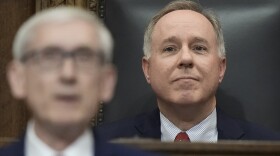We’re into the second half of the Winter Olympic Games in PyeongChang, South Korea. Many of the usual winter sports hotbeds - Norway, the United States, Canada - are near the top of the medal table. But as Lake Effect essayist Art Cyr tells us, the Winter Games may be producing another winner:
A “turning point” toward peace is how South Korea’s Defense Minister Song Young-moo describes the Winter Olympics, which his country is hosting. In a major breakthrough, North Korea is sending a team to the games. Teams form both North and South Korea will march together in the opening ceremonies.
Cooperation goes beyond ceremonial marching. The women’s ice hockey teams from both North and South Korea will compete as a single unit, under a special blue and white Korean unity flag.
The success of South Korea in securing the 2018 Winter Olympics is a major victory with global implications, including but reaching well beyond the world of competitive sports. The games are in the city ofPyeongchang, in mountainous Gangwon-do province only fifty miles from the DMZ (Demilitarized Zone) which separates North and South Korea.
Securing strong support and warm endorsement from the International Olympic Committee (IOC) has to be particularly sweet for both the people and leaders of South Korea. The Committee turned down persuasive well-prepared submissions from Seoul to host the 2010 and 2014 Winter Olympics.
Skiing and other winter sports are relatively new to South Korea, but there is nothing new about frigid freezing winter weather on that peninsula. The Korean War of 1950 to 1953 initially included agonizing winter reversals for unprepared American troops.
What has changed in the past half century is the extraordinarily rapid economic development of the Republic of Korea. Widespread interest in winter sports is a direct reflection of South Korea’s relatively new status as one of the richest nations in the world. The country was among the poorest in the world for approximately a decade after the Korean War.
Securing the 2018 Winter Olympics is part of a sustained, long-term strategy. Competitive sports are but one component of a geostrategic effort to pursue international economic and political influence.
As early as 1970, South Korea endeavored to host the Asian Games. This competition takes place every four years, featuring athletes from across the vast region. Unfortunately, in that year a combination of economic problems and security concerns intervened. The games took place in Thailand with Korea’s financial support.
South Korea did host the Asian Games in 1986, followed by the Olympics in 1988. These tournaments in turn reinforced South Korean emphasis on regional and international organizations. The nation also hosted the Asian Games in the fall of 2014.
Korean career diplomat Ban Ki-moon became Secretary General of the United Nations in 2007. Ban was the first unequivocally pro-Western and pro-U.S. leader to head the world body since the tenure of Dag Hammarskjold almost six decades ago.
Additionally, Dr. Kim Yong Kim is president of the World Bank Group, one of three principal economic agencies of the UN. Dr. Kim was born in Seoul, South Korea and was president of Dartmouth College in the U.S. before assuming his current position.
The Obama administration deserves credit for a shrewd choice. President Kim’s strong professional credentials are undeniable, and he personifies the strong ties between the Republic of Korea and the U.S.
Defense Minister Song mentioned North Korea as part of his keynote address January 29 at the Fullerton Forum of the International Institute for Strategic Studies (IISS), held in Singapore. The IISS based in London is a principal think tank.
South Korea’s government is smart to have the defense minister out front in discussing the games. North Korea remains a ruthless, rigid communist dictatorship.
Arthur I. Cyr is Clausen Distinguished Professor at Carthage College and author of After the Cold War.






